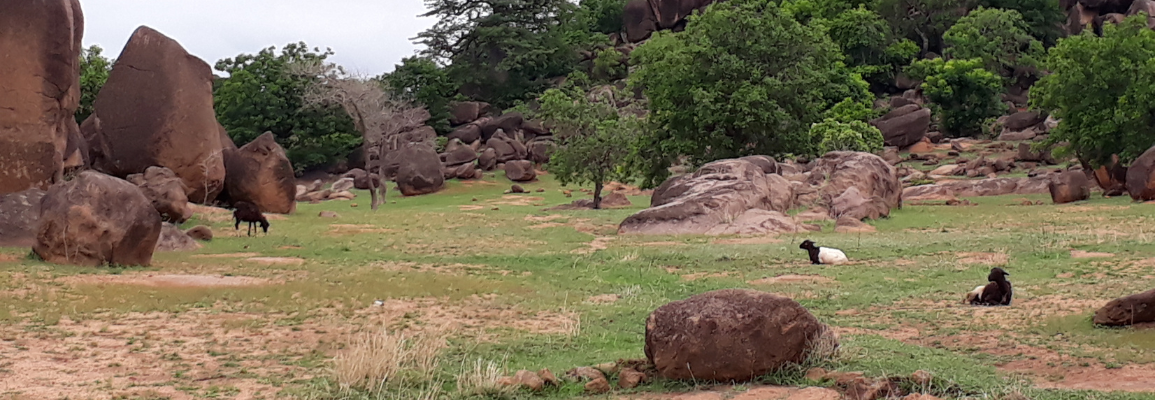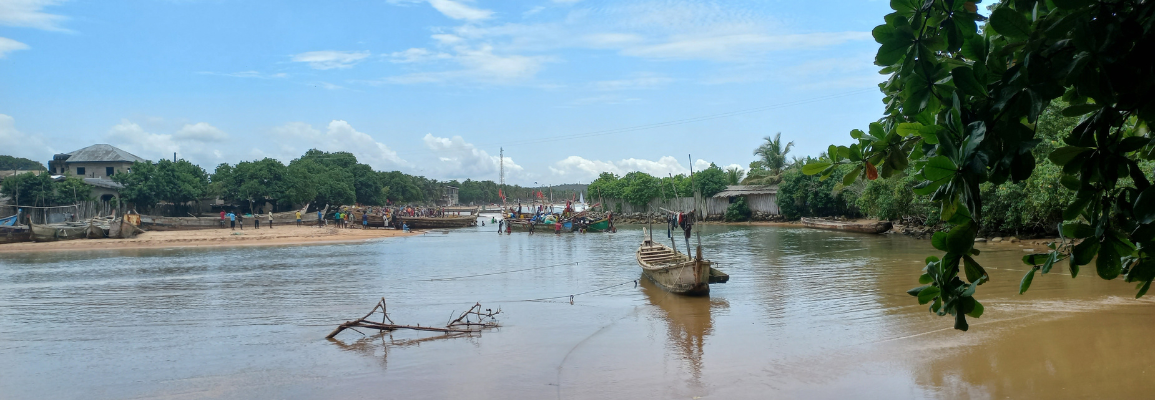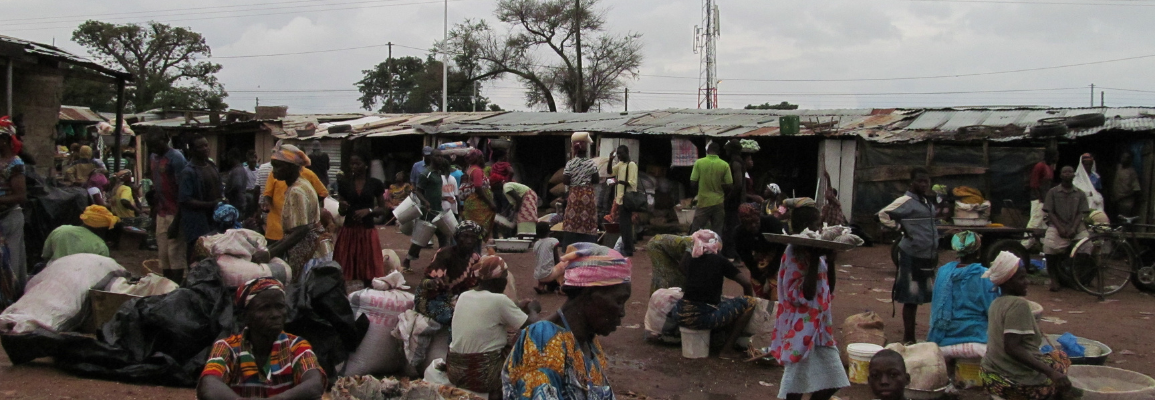Program Dates: July 6, 2023 - July 30, 2023
Sustainable Development Research Practicum in Ghana is a six-credit hour intensive study abroad experience for advanced undergraduates. It has two components: SD 4548 Endogenous Development (3 credit hours) and SD 3549 Methods for Development Research in Ghana (3 credit hours). The program begins in Accra with a briefing with U.S. Embassy officials and a trip to the Kwame Nkrumah Mausoleum and Memorial Park, involves travel to the Elmina slave castle and One Africa Health Resort, and then continues northward to Tamale, Mole National Park, Bolgatanga, Tongo Hills, Paga, and Bongo in northern Ghana, where the bulk of cultural orientations, coursework and site visits will take place. During the last week of July students return to the South via an overland route through the major gold mining regions of Ghana, with stops in Kumasi and Tarkwa that introduce them to Ghana’s contested political ecologies and histories of large scale and artisanal mining. From Tarkwa students travel to Busua and stay at Ahanta Eco-Lodge, whose mission is to promote sustainable tourism in the Western Region of Ghana. Students get the opportunity to both learn a range of methodologies (participatory rural appraisal, grant writing research, critical historiography and archival research, interviews, participant observation, discourse analysis, agricultural and land economics, language analysis, and endogenous methodologies) and how they apply to the work of university faculty, development planners, government institutions, local NGOs and community partners in Ghana.
Location
Ghana is a country in West Africa. It abuts the Gulf of Guinea and the Atlantic Ocean to the south, sharing borders with Ivory Coast in the west, Burkina Faso in the north, and Togo in the east.With nearly 31 million inhabitants (according to 2021 census), Ghana is the second-most populous country in West Africa, after Nigeria. The capital and largest city is Accra; other major cities are Kumasi, Tamale, and Sekondi-Takoradi.
The first permanent state in present-day Ghana was the Bono state of the 11th century. Numerous kingdoms and empires emerged over the centuries, of which the most powerful were the Kingdom of Dagbon in the north and the Ashanti Empire in the south.Beginning in the 15th century, the Portuguese Empire, followed by numerous other European powers, contested the area for trading rights, until the British ultimately established control of the coast by the late 19th century. Following over a century of colonisation, Ghana's current borders took shape, encompassing four separate British colonial territories: Gold Coast, Ashanti, the Northern Territories and British Togoland. These were unified as an independent dominion within the Commonwealth of Nations on 6 March 1957, becoming the first colony in West Africa to achieve sovereignty. Ghana subsequently became influential in decolonisation efforts and the Pan-African movement.
Ghana is a multi-ethnic country with a diverse population, linguistic and religious groups; while the Akan are the largest ethnic group, they constitute only a plurality. The majority of Ghanaians are Christian (71.3%), with close to a fifth being Muslim and a tenth practising traditional faiths or reporting no religion. Since 1993, it has maintained one of the freest and most stable governments on the continent and performs relatively well in metrics of healthcare, economic growth, and human development.Ghana consequently enjoys significant influence in West Africa. (Source: Wikipedia)
Academics
Program participans will enroll in both of the following courses.
Course Prefix | Course Name | Credits | Instructor |
SD 3549 | Methods for Development Research in Ghana | 3 | Anatoli Ignatov & Jacqueline Ignatov |
SD 4548 | Endogenous Development | 3 | Anatoli Ignatov & Jacqueline Ignatov |
Faculty Leaders
Dr. Anatoli Ignatov
Associate Professor
Department of Sustainable Development
anatoli@appstate.edu
Biography
Anatoli Ignatov is an Associate Professor of Sustainable Development at Appalachian State University. His current research interests include environmental political theory, African political thought, African land politics and policy, postcolonial theory, endogenous development, and law and development. His research has been focused on traditions of sustainability and ecological political thought in Africa that remain largely invisible within the dominant Euro-American orientations of political theory and development studies. He is currently completing a monograph Decolonizing Land Politics: Legal Pluralism, Conflict, and the Reinvention of Political Authority in Ghana. His scholarly work has appeared in Africa, Political Theory, GeoHumanities, Contemporary Political Theory, Theory & Event as well as numerous edited volumes.
Ignatov’s research, which was supported by a Ghana Fulbright Scholar grant (2017-2018), examines contemporary conflicts over the ownership of land in Northern Ghana. Land in Ghana is characterized by a plural legal system where customary and statutory systems overlap. Drawing on over ten years of field research in Ghana, the project examines these conflicts not merely as struggles over access to “resources” but also as conflicts over law, authority, identity, and ecological governance. By elucidating the tensions between customary and formal land rights regimes and how these tensions shape and have been shaped by Ghana’s Land Administration Project and various donor interventions intended to promote development, Ignatov’s research aims to contribute to policy and scholarly debates about land governance in Africa.
Dr. Jacqueline Ignatova
Associate Professor
Department of Sustainable Development
jignatova@appstate.edu
Biography
Jacqueline A. Ignatova is an Associate Professor of Sustainable Development at Appalachian State. She has been conducting research in Ghana since 2011; in 2012, Ignatova was awarded a Fulbright fellowship to support her doctoral research on the politics of food and agriculture in Ghana. Her book, Contesting Africa's New Green Revolution: Biotechnology and Philanthrocapitalist Development in Ghana, was published in 2021 with Zed/Bloomsbury. She is excited to get the opportunity to connect students with the communities of people and mentors that have shaped her research in Ghana. Ignatova's current research examines women's community ecological governance of tree and seed commons in northern Ghana. In addition to her research in Ghana, Ignatova supports local food justice organizations in the High Country and is currently the Vice Chair of the Board of Directors of F.A.R.M. (Feed All Regardless of Means) Cafe.
Program Cost: $5,792
Program cost includes airfare, lodging, meals, in-country transportation.
Estimated Additional Expenses | |
Undergraduate Tuition - Resident | $152.54 / credit hour |
Undergraduate Tuition - Non-Resident | $172.54 / credit hour |
Graduate Tuition - Resident | $187.54 / credit hour |
Graduate Tuition - Non-Resident | $207.54 / credit hour |
Personal Expenses | $250 |
Passport | $150 |
Visa | $89.75 |
Required Vaccinations | $350 |
Local Sim Card | $60 |
Please note that non-billable costs are estimates only and will be affected by personal spending habits, currency fluctuations, etc. Prices listed in USD unless otherwise noted. Students are encouraged to start planning for their study abroad program costs well in advance.
Payment Schedule | Amount | Deadline |
Deposit | $300 | Upon receipt of application |
Payment 1 | $1,830.66 | 2/15/2023 |
Payment 2 | $1,830.67 | 3/15/2023 |
Payment 3 | $1,830.67 | 4/15/2023 |
Appalachian reserves the right to cancel or alter the program format or to change costs in case of conditions beyond the university's control. Further details about Appalachian's withdrawal/cancellation policy can be found at this link.
Application Process
- In order to apply for this program, you will need to first complete the Summer 2023 Sustainable Development Research Practicum in Ghana Application.
- When permission to apply for the program is granted, you will receive an email from the faculty leaders with a link to the application and further instructions.
- Your application will be considered complete when you have submitted it and paid the $300 deposit fee. The fee cannot be paid until it appears on your student account. Please note that it may take 2–3 business days for it to post to your account. You will receive an email with Instructions for paying the deposit fee. Instructions can also be found in the application.


